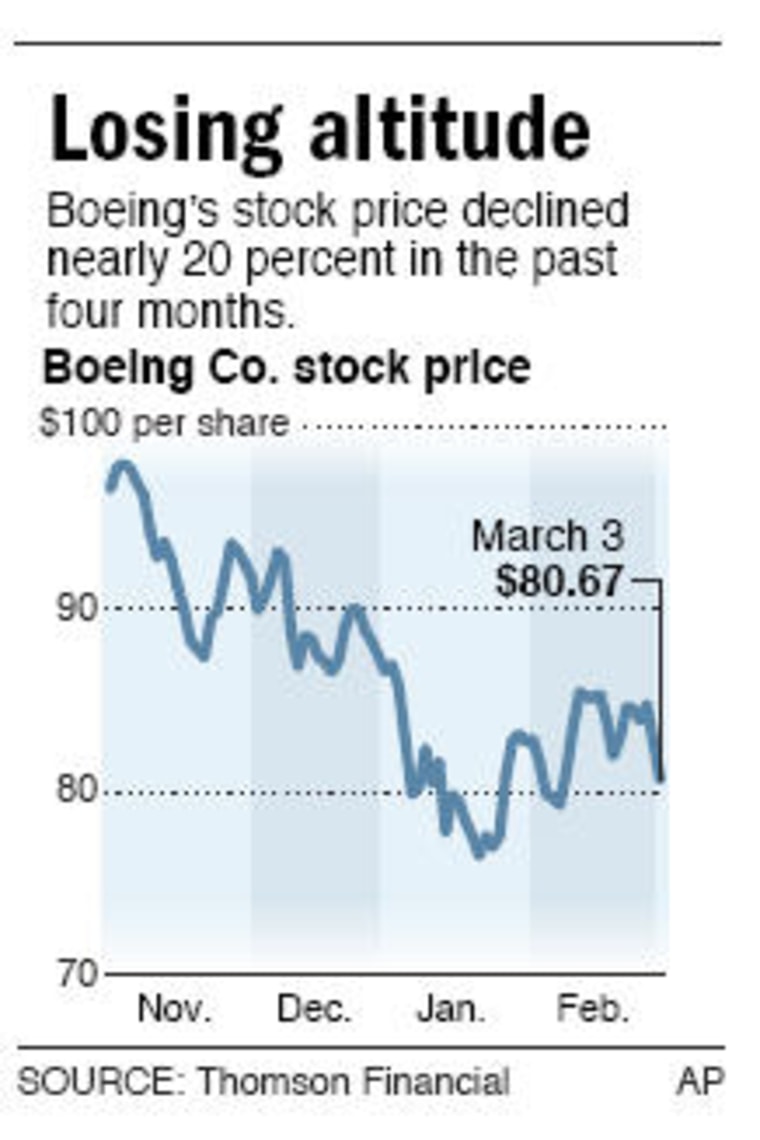Boeing did not need an extra day of February to know the month was showing it no love. But the leap year's supplement delivered the cruelest news: the loss of a $35 billion Air Force contract.
Before that stomach punch connected, Boeing Co. had heard this from Washington in February: Three of its military contracts had cost $3 billion more than projected and its work on a virtual fence along the U.S.-Mexico border had failed to meet expectations.
Boeing's sheer size enables it to withstand a month of high-profile setbacks, but Wall Street and industry analysts say the nation's largest aerospace firm is paying for its decision to move beyond aircraft making.
In 2003, Boeing established itself as a player in the government technology arena when it teamed with SAIC Inc. and won a multibillion-dollar contract to overhaul the Army's combat and communications systems, said Ray Bjorklund, chief knowledge officer at market research firm Federal Sources Inc. The Future Combat Systems modernization deal, which involves revamping the Army's command, control communications, computers, intelligence, surveillance and reconnaissance — or C4ISR — capabilities, also has had its share of delays and cost concerns, but appears to be doing better lately.
"I don't think a company of that stature and that size ... is going to step out of the C4ISR business," Bjorklund said. "February was an unfortunate congruence of the stars."
March's stars have yet to realign. Boeing shares were down nearly 4 percent Monday afternoon.
Boeing, which last year reported an 8 percent jump in revenue to $66.4 billion, can handle the financial hit of losing the tanker deal, but "the bigger loss is to prestige and the hit to ego," said Scott Hamilton, an aviation industry consultant based outside of Seattle.
Stockholders are still smarting from February's finale: On Friday, the Air Force awarded Northrop Grumman Corp. and European Aeronautic Defence and Space Co., the maker of Airbus planes, a $35 billion contract to build airborne refueling planes.

The selection surprised industry analysts and dropped jaws in Congress and statehouses, where constituents were counting on plane-building jobs. Chicago-based Boeing had been supplying refueling tankers to the Air Force for nearly 50 years and did not expect to lose that monopoly to EADS, its top foreign rival in the commercial aircraft market.
"This is another big competitor on their home turf and that hurts," said Richard Aboulafia, an analyst with the aerospace consulting firm Teal Group. The timing didn't feel good either: Boeing's defense business lost a major Pentagon expenditure, as military spending begins to level off following years of increases tied to the war in Iraq.
Boeing spokesman Dan Beck countered that the company's defense business will remain part of its core.
"There is no need for doom and gloom with regards to Boeing's defense business," Beck said. "We have a very extensive and very diverse portfolio."
Boeing said it hasn't decided if it will protest the contract. Analysts say the decision will be hard to overturn because the Air Force, stung by a previous Boeing-tanker scandal, made its selection process more rigorous. In 2004, Boeing lost the tanker leasing contract after an investigation uncovered illegal dealings between a top company executive and a chief Air Force weapons buyer that landed both in prison.
The company faced a hostile crowd on Capitol Hill days before the tanker contract was announced. Department of Homeland Security officials last week told lawmakers the company's "virtual fence" project along the U.S.-Mexico border did not meet contract requirements for detecting border intrusions and that plans to expand the system will be pushed back three years to 2011 because of technological deficiencies.
Boeing's Roger Krone told the House Homeland Security Committee that the company spent more than double the value of the $20 million contract to help mitigate the problems and is now refining the network. The government still awarded Boeing a more than $60 million contract to improve the network in December, two months before it accepted work on so-called Project 28 near Sasabe, Ariz.
Elsewhere last month, the Government Accountability Office found that three multiyear military contracts with Boeing cost the government at least $3 billion more than originally projected. The GAO said unit cost overruns of up to 30 percent came from increases in labor expenses and material costs, and that none of the programs delivered the anticipated savings that the government had hoped for by awarding multiyear funding.
Companies of Boeing's size are used to taking hits on major contracts and to not winning every deal they compete for, Bjorklund said, although those disappointments are normally spread out over a quarter, or even a full year.
"This is not an indicator of a pervasive problem," he said.
Shares of Boeing fell $2.12, or 2.6 percent, to close Monday at $80.67.